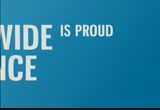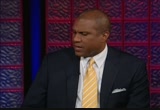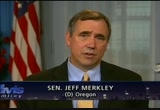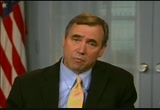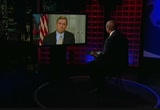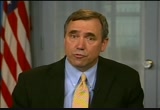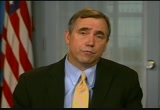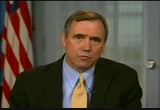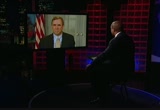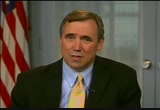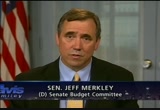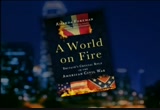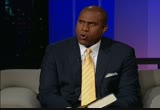tv Tavis Smiley PBS July 7, 2011 12:00pm-12:30pm EDT
12:00 pm
>> good evening. from what santa claus, i am tavis smiley. president obama has the to bring troops home by the end of 2015. for some, that is not enough. senators called on him to reconsider the afghanistan strategy and bring home all of the combat truce by the end of next year. also, a conversation with noted british historian and and the four men -- amanda foreman.
12:01 pm
she has a new book called "a war on fire." >> every community has martin luther king boulevard. that is the cornerstone we all know could is not just a street garble bought, but a place to gather with your community. make every day better. >> nationwide insurance supports tavis smiley. we are happy to join him to combat illiteracy. nationwide is on your side. >> and by contributions to your pbs station from viewers like you. thank you. >> jeff merkely wrote an op-ed
12:02 pm
in the new york times on tuesday titled let's not linger in afghanistan. he joins us tonight on capitol hill. thank you for your time. >> is great to be with you. when you say that we are lingering in afghanistan, can you define the word "lingering" for me? >> that means that our mission has been completed. in this case, the mission was to take the taliban out of power in afghanistan, to destroy al qaeda training camps, and to find those responsible for 9/11. the nation-building mission
12:03 pm
turned out to be very problematic. we need to pull the plug on that experiment and redeploy our forces and redeploy our resources. tavis: this is the all hell will break out if we pull out completely. what is your response? >> let me explain a little bit further. there are those who talk about staying to build an effective police. but literacy is very low. the police numbers are completely added. there is an enormous amount of carson. the police in afghanistan are fugs. we eatow they are -- we
12:04 pm
them and train them and now we have a trained and equipped thugs. you think via administration has decided we still need to be there? >> the administration uses some of the language in saying that we need to change your direction. he is doing so in a very slow pace that keeps us in this nation-building capacity. i think it is very hard to reverse course. that has proven itself time overtime as our nation becomes involved in foreign settings. every once in awhile, we need to reevaluate early, ask ourselves about the fundamental reasons we are there, and as if the current strategy best serves our national security and the
12:05 pm
current strategy does not. tavis: how do you all know that pulling out troops by the end of next year is a wise strategy? is that not something that the military leaders on the ground would know best? what we're not talking about taking and eliminating one strategy and having no other strategy. all we're saying is this. for example, let's take on the training camps. the cis estimates that they're less than 100 al qaeda, perhaps less than 50 in afghanistan. we know they're far more in other countries in the world. so we need to have a counterterrorism strategy that takes on the terrorist forces where they are, not trying to create institutions that have never existed in afghanistan that are not being created in a manner that will actually be enduring in terms of serving the people and creating a national security infrastructure that is
12:06 pm
completely affordable. the cost of simply maintaining the afghanistan forces would cost about $12 billion a year. this is a country with a gdp that has been less than $10 billion per year. there is not a sense of a sustainable strategy. not from a corruption in all, not from a service animal, not from the quality of the military institutions we have been willing to create. tavis: what i am asking is what role military leaders on algroud have been making a decision on when it is time to leave and can three senators who sit in washington make that decision on when is the best time line to make that decision? >> we are founded on a tradition of civilian governance. the military works in relationship to the civilian- elected structure. that is what democracy is. military leaders have weighed in on both sides of this. if you take a look at the letter
12:07 pm
that 27 senators sent to the president, it was endorsed by four army generals. many more could we include this is a situation where military experts -- many more could weigh in. this is a situation where military experts are arguing that spending $20 billion a year in afghanistan in the context of our global national security responsibilities is a misuse of resources. in fact, it is being spent in a way that is not on a successful trajectory. that is of what to q -- tavis: i want to quote from your op-ed. it was america that was hurting in the vietnam excursion. "we have a record deficit and a debt that is over $14 trillion
12:08 pm
and growing. we're spending $10 billion a month in afghanistan. we need to change course." tell me more about what you think is not being done here at home for the sake of this afghanistan excursion abroad. >> a whole lot. if you want a 30,000-foot you, it is this. we're spending more on foreign bases and more on foreign wars and not enough on infrastructure and education. we're becoming the first generation of adults whose children are getting less education than we got because of the high tuition costs and the lower scholarship availability, if you will. we are becoming a generation that is being out-built by developing countries around the world. china is spending 10% to 12% of their gdp on infrastructure. europe is spending about 5%. the united states is spending
12:09 pm
2%. there's barely enough to repair the infrastructure we currently have. any american who has a chance to travel throughout all world will realize that we are falling behind. in the long term, falling behind on our education and infrastructure is a formula for america be weaker, not stronger. we need to recognize that these resources to make a difference. just to translate this, if you took $100 billion and said, well, how much would that create if we employ people thinning forests and that's something, that would be 40 $20,000 job. it would be $5,050,000 jobs. -- it would be 5 million $50,000 jobs. there is a huge impact to be made on employment that will put
12:10 pm
america back to work and stabilize their families. that is just one way of trying to frame -- framing institutions and where our money is feeding the corruption that makes that strategy unworkable. tavis: you are a democrat. the senate is controlled by democrats. the house is controlled by republicans. what do your fellow democrats not get about what you laid down. you say we are spending too much ground -- too much abroad and not enough is being done here. but the democrats are controlling washington. >> if you look at the list of folks who sent a letter to the president, you have 25 democrats, others who did not sign the letters stood up on the floor and made the same
12:11 pm
argument. carl levin has called for a 15,000 troop drawdowns this year. you see a tremendous shift in terms of both democrats and republicans. i have had so many conversations with colleagues on both sides of the aisle in the course of seeking to encourage people to sign this letter. the fact that 27 senators signed it, the fact that it was bipartisan, the fact that it include committee chairs shows you a huge shift and a shift that it is responding to the american people. the matter what kind of county town hall i am in, folks overwhelmingly, in conservative ambergris account is, overwhelmingly believe that we are misusing our resources and putting our sons and daughters at risk, not in the best
12:12 pm
interest of the u.s. national security. >tavis: what is your view on this debate about the debt ceiling and the republican demand to link it to deficit reduction? we're getting very close to defcon 1. >> as -- what is to happen is that the republicans need to stop defending the programs in the tax code that protect the wealthy. that is the type of vision that democrats are fighting for, that we have spending cuts both in direct spending and spending embedded in the tax code. that could bring us together and forge a document of vision that will serve our country well.
12:13 pm
tavis: we will see what happens in the coming months on this particular issue. thank you for your time. >> thank you. tavis: up next, amanda form eman. stay with us. she is a baest selling author and her latest is called "a world on fire, britain's crucial wall it need civil war." good to have you on this program. let me start by asking you what there is to value or appreciate about the british role? why should we care about the british rule, what they thought about the civil war? >> it is very hard to even believe that, once upon a time, britain was the most powerful country on the planet.
12:14 pm
in the 1860's, it mattered. which side britain chose would determine the course of the war. at the beginning, britain went neutral credit that allowed the role of the south to do get out. they spend the rest of the war .rying to change britain's mind more than that, the southern coast was located by federal ships. the only way it would get its arms and medicines and volunteers from of is if they wanted over. they equated those block gators and give themselves a lifeline for almost two years -- they either aided -- they eveaded those blockaders and gave
12:15 pm
themselves a wi-fi from most years. was hours away neutral on a war that was over the instrument of black people. when they did get involved, they took the side of the south. how my supposed to read that about britain? >> from the historian's perspective, there is the failure of american foreign policy at the beginning of the war. at the very beginning, the north was knocking at an open door and britain was ready to ally itself with the north. we have letters from the british investor that shows that. but the secretary of state had a different plan. he believed that committee could provoke a foreign war, that would reunite the north and the south. then you have a common enemy. and there was no greater common enemy at that time than britain could of course, that failed. by the time stewart realized that, it was too late.
12:16 pm
the second tragedy is that southern propagandists, which was much better than the north, when it went to england, the line that they gave this was that the north is fighting for empire and the south is fighting for freedom. the horrible, horrible tragedy is that britain took that line and believed it. and the north did not help its cause, particularly with the draft fight in 1863 in new york city where hundreds of african- americans were murdered by an irish-led mob. europe said that the north were hypocrites. it treats its free black citizens disgustingly. so why should we support the north over the south. propagandists but that and said not only are the no. hypocrite, but the south is very paternal with slavery.
12:17 pm
we will deal with slavery in our own time. support us now and then we will do with slavery leader. tavis: freedom from what? the south is arguing to britain that this is about freedom. what kind of freedom? >> the 7 line is that they were fighting for the right to -- the southern line was that they were fighting for the right for self- determination. the 1860's was a time of upheaval and it follows several revolutions in europe. when the south said we want to be free of northern control, that had a catchy ring to it. but john stuart mill's said, hang on a second. the south is fighting for the right to have the freedom to take away the freedom of others.
12:18 pm
you know what happens when people become morally fashionable, it is almost impossible for the people to break that line could it is the emperor has no clothes syndrome. you can break it. tavis: so the queen at the time issues a proclamation of neutrality. tell me more about what the people were saying. just because the queen said something, it is nominally subject agree with the queen. >> when the queen declared neutrality, she gave the government line. but actually, she was prone northern. she was not pro southern pensioners should more than -- she was not pro southern. shia understood more than most people -- she understood more than most people.
12:19 pm
a lot of people who work in a entertainment industry, some aristocracies, undergraduates, it was trendy to vote for the south. all of the philosophers supported the north. in "the education of henry adams," hero to that busy he wrote that the british are eccentric and so were the self and they appreciated that. so were the south and they appreciated that.
12:20 pm
they were instinctively anti- slavery. nothing was going to convince them otherwise of that. there understood the fundamental truth of that in the way that people in their ivory towers do not. because of the economic suffering they endured through not having any cotton throughout the war in the south, there was the largest casual campaign in british history to keep them going body and soul through charitable projects. even though it was suffering, it was not as much as someone turned off all the oil in the world. >> so the cot and workers in england, where the empathizing with the north -- so the cotton workers in england, were they empathizing with the north as an economic argument or a humanitarian argument?
12:21 pm
>> it was a humanitarian argument. it was not that everybody in england was pro-south. many of the anti-slavery campaigns, including the great aristocratic families, understood that. tavis: what was the view of president lincoln at the time? >> it was very terrible, actually. about four months ago, one of the main editors of "the guardian newspaper," wrote a kind of an apology because he went to the archives and found that they were anti-lincoln. charles francis adams, the american ambassador, he was not so much as anti-lincoln, but he did not believe that the president was up to the job.
12:22 pm
in europe, it seemed incredible that a man from a lowly background who was self-taught, who had never been abroad, could have the top job in the country. it was alien. it was from another universe. they never thought that he was handling the war well. of course, one of the many great attributes that we assign to lincoln now, we only understand them afterwards, not what people understood at the time. tavis: as the war went on, did the view of lincoln never shift inside england? >> there was a damn alexian conversion -- there was a damasian conversion at the last second, when he was assassinated. why did lincoln handle foreign affairs so badly, not knowing that he had left it in the hands of the secretary of state?
12:23 pm
even in those days, it felt to be good-looking and lincoln was famously ugly. he looked like an enormous coral appeargorilla. he walked with his hands like this instead of like that. people made fun of him. there was a kind of looksism that went with it. when he died, two magazines issued apologies. tavis: what has been the intellectually inside england as you have caused your fellow citizens to confront where they were, where they stood, with a data and did not do during this crucial time in the world? but there is a historical
12:24 pm
reaction and a present reaction. this is a fable. this is a fable about the dangers of being morally fashionable. i think that has produced a certain amount of shame and some kind of self questioning. if people then, undergraduates, academics, people in the church could be so easily misled and think that they were fighting the good fight and think that they had the moral high ground when they did not and were completely fooling themselves about what was right and what was wrong, what does that say today? when you jump on that and lighting, is it the right bandwagon to be on? -- when you jump on that bandwagon, is it the right bandwagon to be on? no one has ever written on this before. occasionally, people have looked at various aspects. it is not that no one has ever
12:25 pm
written about british involvement. but no one ever attended to write one enormous epic history of all of that together and entered the whole war to see where it fayed. tavis: when you have done it. your new hbo series underscores the fact that you have done it very well. the book is called "war on fire, britain's crucial role in the american civil war." thank you for watching. as always, keep the faith. >> for more information on today's show, visit tavis smiley on pbs.org.
12:26 pm
tavis: next time we will have michael rappaport. >> every community has watch and the the king will abide. it is not just a street or a boulevard, but a place to stand together with your community. make every day better. tavi>> nationwide insurance is proud to join tavis in improving liturgy. nationwide is on your side. >> and by contributions to your pbs station from viewers like you. thank you.
116 Views
IN COLLECTIONS
WMPT (PBS) Television Archive
Television Archive  Television Archive News Search Service
Television Archive News Search Service 
Uploaded by TV Archive on

 Live Music Archive
Live Music Archive Librivox Free Audio
Librivox Free Audio Metropolitan Museum
Metropolitan Museum Cleveland Museum of Art
Cleveland Museum of Art Internet Arcade
Internet Arcade Console Living Room
Console Living Room Books to Borrow
Books to Borrow Open Library
Open Library TV News
TV News Understanding 9/11
Understanding 9/11
